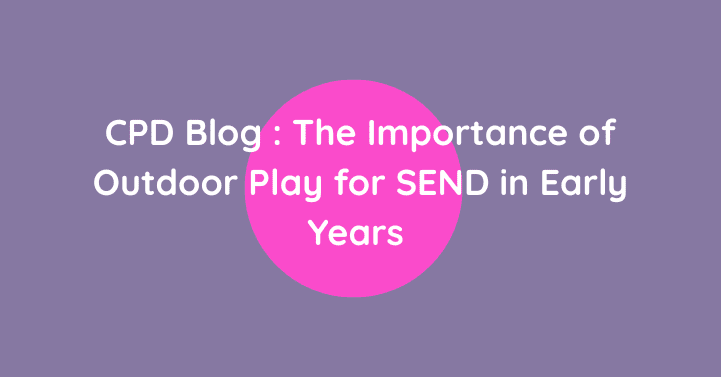CPD
The Importance of Outdoor Play for SEND in Early Years
A Research-Informed Guide for Practitioners
With Muddy Puddle Teacher® Toolkit Guidance
1. Why Outdoor Play Is Essential for SEND Learners
For many children with SEND, the indoor environment can feel overwhelming. Busy visuals, loud noises, confined spaces and constant transitions can create sensory overload and impact behaviour and engagement.
Outdoor play offers a calmer, more spacious and more predictable learning environment. Research consistently shows outdoor environments significantly benefit children with SEND.
Research Highlights
1. Nature supports emotional regulation
Calming sensory input from the outdoors helps children manage stress, anxiety and overwhelm.
Evidence: Wells & Evans (2003); Kelz et al. (2013)
2. Movement improves attention and learning
Outdoor play supports children who need movement to regulate their bodies and focus.
Evidence: Faber Taylor & Kuo (2009)
3. Sensory exploration builds brain pathways
Young SEND learners build cognitive foundations through rich, hands-on sensory play.
Evidence: Gabbard (2008); Brussoni et al. (2015)
4. Nature reduces behavioural challenges
Time outdoors is linked to improved behaviour, increased patience and lower frustration.
Evidence: Saito et al. (2020)
5. Outdoor play strengthens communication
Environments with less pressure help children communicate through gesture, sound, eye contact or alternative communication.
Evidence: McCree et al. (2018)
2. Why Outdoor Play Is Especially Powerful for SEND in Early Years
SEND learners often need:
-
More space
-
More movement
-
More sensory input
-
Less noise
-
Less visual overload
-
Predictable boundaries
-
Flexible learning opportunities
Outdoor areas provide all of these naturally.
Key SEND Benefits Outdoors
-
Lower anxiety, leading to higher engagement
-
Improved sensory processing
-
Increased confidence and independence
-
Easier regulation during transitions
-
More opportunities for child-led exploration
-
Reduced behavioural incidents
-
Richer non-verbal communication
Evidence: Änggård (2011); Barrable (2019)
3. High-Quality Outdoor Play for SEND Learners
SEND outdoor play should be:
-
Sensory-rich
-
Predictable
-
Safe and structured
-
Low-pressure
-
Repetitive (to support mastery)
-
Adapted to individual needs
-
Flexible and child-led
Types of Outdoor SEND Play
Sensory Play
Mud, sand, water, leaves, stones, bark, clay.
Regulation Play
Running, climbing, spinning safely, crawling, simple obstacle paths.
Communication Play
Role-play, puppet play outdoors, pointing games, making choices using natural items.
Investigative Play
Puddles, shadows, weather, insects, sinking and floating.
Imaginative Play
Dens, stick characters, natural small-world setups.
4. Barriers for SEND Children — And How Outdoors Removes Them
Common Indoor Barriers
-
Noise
-
Bright lights
-
Social pressure
-
Dense visual displays
-
Limited movement
-
Sensory overload
-
Confusing transitions
How Outdoors Helps
-
Predictable, calming environment
-
More space to move freely
-
Reduced sensory load
-
Natural sensory regulation
-
Less rigid expectations
-
Clear physical boundaries
-
Fewer behavioural triggers
For many SEND children, learning outside may be the place where they are most successful.
5. The Muddy Puddle Teacher® Toolkit for SEND Learners
The Toolkit uses natural and upcycled resources that support sensory regulation, communication and physical needs.
Toolkit Methods That Support SEND
1. Bamboo Method
-
Ideal for clear boundaries
-
Shape play, measuring, movement tasks
-
Supports children who need structure
2. Rope Method
-
Provides personal space
-
Great for communication, turn-taking, sensory movement
-
Helps create safe pathways and visual cues
3. Clay Method
-
Excellent for fine motor skills
-
Calming sensory input
-
Enables expression without verbal language
4. Stick & Stone Method
-
Sorting, counting, matching, patterning
-
Simple communication games
-
Great for children who need tactile feedback
5. Puddle Play Method
-
Supports sensory exploration and science concepts
-
Encourages language, excitement, shared attention
-
Excellent for early communication
6. Loose Parts Method
-
Tyres, crates, tubes for creative problem-solving
-
Strengthens gross motor skills
-
Supports teamwork and choice-making
All methods work in small or large outdoor spaces — even concrete yards.
6. Practical Outdoor Activities for SEND in Early Years
Communication & Language
-
“Show me” games with natural objects
-
Outdoor sound walks
-
Choice-making with stones, leaves, or sticks
Social & Emotional Development
-
Co-building dens
-
Team rope challenges
-
Sensory calming stations
Physical Development
-
Carrying logs or stones
-
Navigating rope paths
-
Climbing small mounds or steps
Literacy
-
Sensory mark-making in mud or water
-
Making letters with sticks or rope
-
Storytelling with natural objects
Maths
-
Sorting leaves or stones
-
Counting natural collections
-
Shape forming with bamboo
Understanding the World
-
Bug hunts
-
Weather observations
-
Exploring puddles, shadows, textures
7. Why Natural & Upcycled Items Are Ideal for SEND
Natural materials support SEND development because they:
-
Offer sensory variety
-
Provide grounding tactile feedback
-
Reduce visual overload
-
Are open-ended and adaptable
-
Encourage independent exploration
-
Reduce cost and waste
-
Align with Loose Parts Theory (Nicholson, 1971)
8. Reflection Questions for Early Years SEND Practice
-
Which SEND children benefit most outdoors?
-
How do their behaviours differ inside vs. outside?
-
Which Toolkit method could you introduce this week?
-
What natural or upcycled resources could support regulation?
-
How can outdoor experiences support your SEND targets/EHCP outcomes?
-
What barriers do we still need to remove outdoors?
9. Next Steps for Staff Working with SEND
Deepen your practice with:
-
The Muddy Puddle Teacher® Level 1–4 Programme
-
SEND specialism courses
-
Outdoor-based ASD, Dyslexia/Dyscalculia and physical disability modules
-
Free demonstrations on our social media platforms
For bookings and enquiries:
info@themuddypuddleteacher.co.uk


